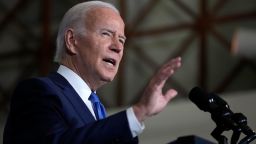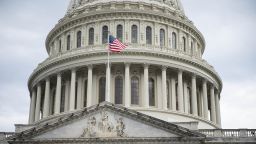Joe Biden’s eloquent defense of democracy was a message Americans needed to hear. But it was not the one voters most want now from their president – that relief is at hand from the soaring cost of living.
Biden’s speech Wednesday, delivered blocks from the US Capitol that was ransacked by ex-President Donald Trump’s mob on January 6, 2021, was a strong election-closing argument. But for an election other than the one taking place next week.
That’s not to say that the warning was misplaced. The fact that Biden felt the need to say, “We can’t take democracy for granted any longer,” underscores the grave threat posed to America’s core values by political violence and election denialism. If a president does not safeguard this historic legacy, who will? The chaos and violence Trump incited after the 2020 election show what unfolds when a president chooses to try to destroy democracy for personal gain.
Biden’s speech was deeply personal, reflecting his own view of the mission handed him by history. It was also highly political given that the midterm elections, which feature scores of pro-Trump candidates spouting his stolen election nonsense, are only five days away. And it came days after the latest shocking example of political violence – the attack on the 82-year-old husband of Democratic House Speaker Nancy Pelosi. And since Biden launched his 2020 campaign as a quest to save America’s soul from what he sees as the aspiring autocracy of Trump, it was a statement of a mission unaccomplished – as well as a potential opening volley of a possible 2024 showdown for the White House between the 45th and 46th presidents.
“You have the power, it’s your choice, it’s your decision, the fate of the nation, the fate of the soul of America lies, as it always does, with the people,” Biden told voters.
What is the election really about?
Elections should be about more than one thing. Voters can walk and chew gum at the same time. But the harsh truth is this: In Washington, where just a glimpse of the towering Capitol dome reminds politicians and their media chroniclers of the January 6 horror, the threat to democracy feels visceral.
But in the heartlands of Pennsylvania, the suburbs of Arizona and cities everywhere, the gut check issue is less the somewhat abstract and age-old concept of self-government. It’s the more basic one of feeding a family. This is an election more about the cost of a cart full of groceries or the price of a gallon of gasoline than America’s founding truths.
As Scottsdale, Arizona, retiree Patricia Strong told CNN’s Tami Luhby: “The price of everything was better during Trump,” adding, “We were looking forward to retirement because everything was good.”
Declining stock markets have hurt retirement accounts and Americans with credit card debt took another blow Wednesday when the Federal Reserve raised its short-term borrowing rate by another 0.75%. There are fears the Fed’s strategy could pitch the economy into recession and ruin one of the best aspects of the Biden economy – the low unemployment rate.
Biden’s argument is implicitly that while inflation will fall, and economic damage can be repaired, the current election – and its legions of anti-democratic Republican candidates – could cause political wreckage that is beyond mending.
But it’s a tough case to make in such a doom-laden political environment for Democrats. The millions of Republicans who believe Trump’s falsehoods about the last election don’t listen to Biden and his call for national unity anyway. His low approval ratings don’t help. And in a new CNN/SSRS survey published on Wednesday, for instance, 51% of Americans said inflation and the economy was most driving their vote in the midterms. Abortion – the issue Democrats hoped would save them next Tuesday after the Supreme Court overturned Roe v. Wade this summer – was the only other concern in double figures, polling at 15% of likely voters. And voting rights and election integrity – the focus of the president’s speech on Wednesday night – polled at only 9%.
But Biden effectively asked voters to make a concern well down the list of their priorities the decisive factor when they cast their ballots.
“This year, I hope you’ll make the future of our democracy an important part of your decision to vote, and how you vote,” he said. “Will that person accept the outcome of the election, win or lose?” he added, at the end of a campaign in which several GOP nominees have not guaranteed they would accept voters’ will.
In places where Biden is unpopular, Democrats in tight races have made an explicit point about distancing themselves from the national party.
“You know, the national Democratic Party has never been really good at strategic political decisions. So you know, it is not a surprise here, and thank God that I have enough experience that I’ve built this campaign not needing them and we really don’t want them at this point. We’re gonna do this thing with all the grassroots people we have here,” Rep. Tim Ryan, who is in a tight race for US Senate in Ohio against J.D. Vance, told “CNN This Morning” on Thursday.
A flawed economic strategy opens the door to Trumpism
It’s not that Biden hasn’t been also talking about high prices. His pitch is that the billions of dollars of spending in his domestic agenda will lower the cost of health care, lift up working families and create millions of jobs. That may be the case, but things that could happen in the future can’t ease the pain being felt now.
While Biden may be talking at cross purposes with the electorate on these issues, they are linked, in a fateful way, that he did not mention in his speech at Union Station on Wednesday evening. The president’s failure – whether it is all his fault or not – to quell inflation and the worries of a nation already demoralized by a once-in-a-century pandemic created the electoral conditions that look likely to restore Trumpism to power, in the form of a volatile, extreme GOP majority in the House of Representatives at least, with the Senate still on a knife’s edge.
Throughout history, inflation has often been a pernicious political force that breeds desperation in an electorate and seeds extremism as a potential response. That’s why politicians fear it so acutely and why it is so curious that the Biden White House initially didn’t take the surge of prices that seriously, repeatedly insisting that this was a “transitory” problem caused by Covid-19.
The president also renewed his call for national unity that he delivered in his inaugural address in front of a still violence-scarred Capitol in 2021. He explained that American democracy was primarily under attack because “the defeated former president of the United States refuses to accept the results of the 2020 election.”
“He has abused his power and put the loyalty to himself before loyalty to the Constitution. And he’s made the Big Lie an article of faith in the MAGA Republican Party – a minority of that party,” Biden said, being careful not to insult every GOP voter as he did when referring to “semi-fascism” earlier this year.
The president also argued that Trump’s threat was far broader now than it was in the 2020 election. “As I stand here today, there are candidates running for every level of office in America: for governor, Congress, for attorney general, for secretary of state who won’t commit – who will not commit to accepting the results of the elections they’re running in,” the president warned.
Biden also hinted at a lack of understanding of Trump’s MAGA supporters, who have embraced his anti-democratic, populist, nationalist appeal to mainly White voters, which grew out of a backlash to the first Black presidency of Barack Obama. The 44th president has been making his own searing defenses of democracy and repudiation of Trump on the midterm election campaign trail in recent days.
“You can’t love your country only when you win,” Biden said. The president is right – the essence of democracy depends on the loser in an election accepting the verdict of the people. This is why Trump’s behavior was so noxious in 2020 since his refusal to admit defeat did not just ruin one election. It tore at the fundamental principle of the political system that made America great two-and-a-half centuries before Trump’s political career and caused damage that will long outlast the shockwaves of one administration.
But the essence of the Trump message exists in direct contradiction to Biden’s logic. Such voters can only love their country when their party wins because they see the Democrats that they lose to as the antipathy of their vision of America itself. These dueling understandings of what America actually means are at the core of the current, great political struggle that will not just play out next Tuesday, but in the 2024 election and beyond.




